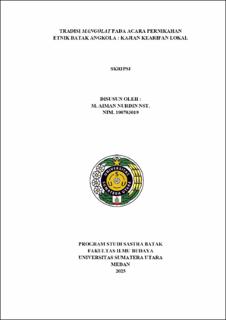Tradisi Mangolat Pada Acara Pernikahan Etnik Batak Angkola : Kajian Kearifan Lokal
The Mangolat Tradition in Batak Angkola Ethnic Wedding Ceremonies: A Study of Local Wisdom

Date
2025Author
Nasution, M Aiman Nurdin
Advisor(s)
Sinaga, Warisman
Herlina, Herlina
Metadata
Show full item recordAbstract
This research, titled “The mangolat Tradition in the Wedding Ceremony of the Batak Angkola Ethnic Group: A Study of Local Wisdom”, aims to describe the stages of the mangolat tradition and analyze the symbolic meanings and local wisdom values embedded within each element. The mangolat tradition is a customary procession conducted after the wedding contract (akad), celebration, and traditional advice-giving (makkobar), symbolizing the formal reception of the bride by the groom’s family. This study is motivated by growing concern over the declining understanding among younger generations regarding traditional practices and the values they carry, as well as the urgency to preserve intangible cultural heritage as a marker of local identity. The research applies a qualitative descriptive method with an ethnographic approach. Data were collected through participatory observation, in-depth interviews with customary figures and tradition practitioners, and visual documentation. The main theoretical framework used is Robert Sibarani’s (2018) theory of local wisdom, which outlines key dimensions such as peace, politeness, social harmony, spirituality, and communal solidarity. Findings indicate that the mangolat tradition consists of several core stages, including: Martonggo Raja (customary negotiation), Mangandung Boru (farewell ritual), transport of the bride’s belongings by Naposo Nauli Bulung (unmarried youth group), reception by the bride’s namboru (aunt), ceremonial seating, delivery of traditional advice through umpasa (oral poetry), communal feast (Mangallang Sadiah), and closing customary prayers. Each stage is not only symbolic but also carries social, educational, spiritual, integrative, and transformative functions. Values such as respect for women, consensus building, communal cooperation, and social status transition are strongly reflected in this tradition and remain relevant today. The study concludes that mangolat is a culturally rich heritage that deserves preservation and promotion, serving as a valuable medium of cultural education for younger generations in strengthening their identity and local character. It also demonstrates that traditional practices are not only symbolic rituals but are living sources of contextual life values in contemporary society.
Collections
- Undergraduate Theses [247]
